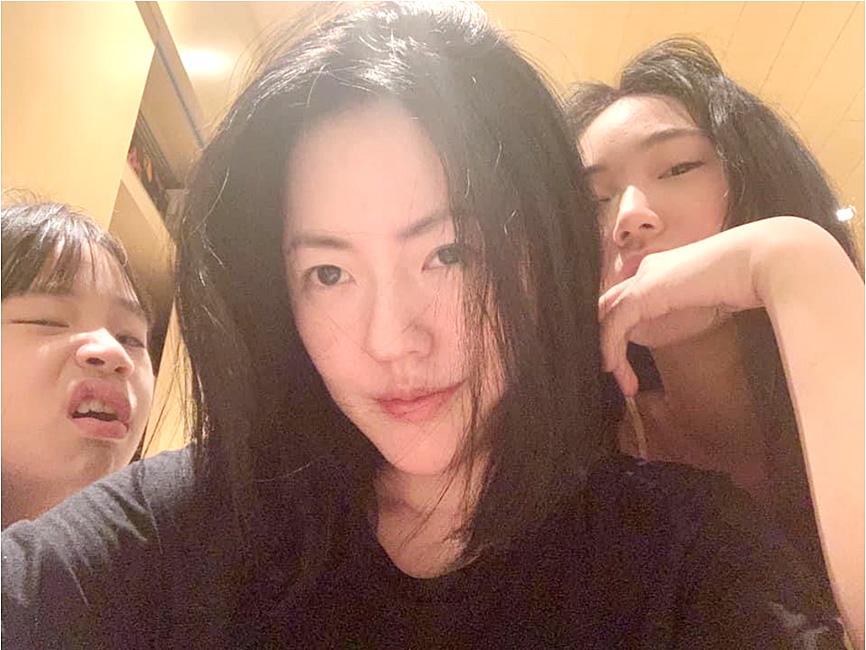A high-profile Taiwanese TV host found herself the latest to draw fire from Chinese Internet users after referring to Taiwan’s Olympians as “national competitors.”
Dee Hsu (徐熙娣) — better known as “Little S” — made the comment in an Instagram post on Sunday during the women’s singles badminton final between Tai Tzu-ying (戴資穎) of Taiwan and Chen Yufei (陳雨菲) of China.
The post drew an angry reaction in China, where nationalist Internet users often police the comments of celebrities and companies for views that clash with the Chinese Communist Party’s official narrative that both sides of the Taiwan Strait are part of “one China.”

Photo copied by Chen Hui-ling, Taipei Times
“Hsu’s Ins” — short for Hsu’s Instagram — quickly became one of the most-searched topics on Sina Weibo on Monday, garnering more than 480 million views as of yesterday.
“Just stay in Taiwan. That way you don’t need to work so hard at being two-faced,” one online commentator said.
A representative for Hsu, who started out as a singer in the 1990s before becoming one of Taiwan’s most high-profile talk show hosts, could not immediately be reached for comment. The Instagram comment that drew outrage has since been deleted.
Most Taiwanese celebrities are careful never to reveal their stance on Taiwan’s political status for fear of being locked out of the lucrative Chinese market or angering fans at home who identify as Taiwanese rather than Chinese.
Hsu was unusual in celebrity circles for being outspoken in her support for former president Ma Ying-jeou (馬英九) of the Chinese Nationalist Party (KMT).
Last year, she was highly critical of the government’s decision to ban exports of medical masks in the early stages of the COVID-19 pandemic, saying they were more urgently needed “in China.”
In the past few years, Hsu has spent an increasing amount of time across the Strait building her brand.
Several companies that sponsor Hsu, including Unilever and sex-toy maker Osuga, have sought to distance themselves from Hsu, saying they would not extend contracts with her, according to the United Daily News and other local media.
Oriental House, a Ningbo, China-based maker of traditional medicinal teas, said it had canceled its contract with Hsu after her Instagram post.
“The nation’s interests are more important than anything else,” it said in a Sina Weibo post. “Resolutely support the one China principle.”
Taiwanese singer Jolin Tsai (蔡依林) was also targeted on Monday after congratulating several of Taiwan’s athletes at the Olympics, with angry Chinese Internet users asking why she had failed to celebrate any Chinese competitors.
Those outside China have found themselves targeted by Chinese state media and Internet users as Chinese President Xi Jinping (習近平) encourages the country to challenge those seen as trying to split or weaken it.
The threat of losing market share in the world’s most populous country has prompted sports leagues, airlines and other multinationals to edit perceived political slights.
Japanese actor Yuki Furukawa was similarly assailed online last week after asking his 4.5 million Sina Weibo users whether they were watching the Olympics as Japan broke China’s 17-year gold-medal streak in mixed doubles table tennis.
“I asked at the wrong time. Should have been more careful of my words,” Furukawa said, after deleting the original post.
Taiwanese athletes have so far won 10 medals in Tokyo — two gold, four silver and four bronze — their best-ever haul.

Taiwanese can file complaints with the Tourism Administration to report travel agencies if their activities caused termination of a person’s citizenship, Mainland Affairs Council Minister Chiu Chui-cheng (邱垂正) said yesterday, after a podcaster highlighted a case in which a person’s citizenship was canceled for receiving a single-use Chinese passport to enter Russia. The council is aware of incidents in which people who signed up through Chinese travel agencies for tours of Russia were told they could obtain Russian visas and fast-track border clearance, Chiu told reporters on the sidelines of an event in Taipei. However, the travel agencies actually applied

Japanese footwear brand Onitsuka Tiger today issued a public apology and said it has suspended an employee amid allegations that the staff member discriminated against a Vietnamese customer at its Taipei 101 store. Posting on the social media platform Threads yesterday, a user said that an employee at the store said that “those shoes are very expensive” when her friend, who is a migrant worker from Vietnam, asked for assistance. The employee then ignored her until she asked again, to which she replied: "We don't have a size 37." The post had amassed nearly 26,000 likes and 916 comments as of this

New measures aimed at making Taiwan more attractive to foreign professionals came into effect this month, the National Development Council said yesterday. Among the changes, international students at Taiwanese universities would be able to work in Taiwan without a work permit in the two years after they graduate, explainer materials provided by the council said. In addition, foreign nationals who graduated from one of the world’s top 200 universities within the past five years can also apply for a two-year open work permit. Previously, those graduates would have needed to apply for a work permit using point-based criteria or have a Taiwanese company

The Shilin District Prosecutors’ Office yesterday indicted two Taiwanese and issued a wanted notice for Pete Liu (劉作虎), founder of Shenzhen-based smartphone manufacturer OnePlus Technology Co (萬普拉斯科技), for allegedly contravening the Act Governing Relations Between the People of the Taiwan Area and the Mainland Area (臺灣地區與大陸地區人民關係條例) by poaching 70 engineers in Taiwan. Liu allegedly traveled to Taiwan at the end of 2014 and met with a Taiwanese man surnamed Lin (林) to discuss establishing a mobile software research and development (R&D) team in Taiwan, prosecutors said. Without approval from the government, Lin, following Liu’s instructions, recruited more than 70 software